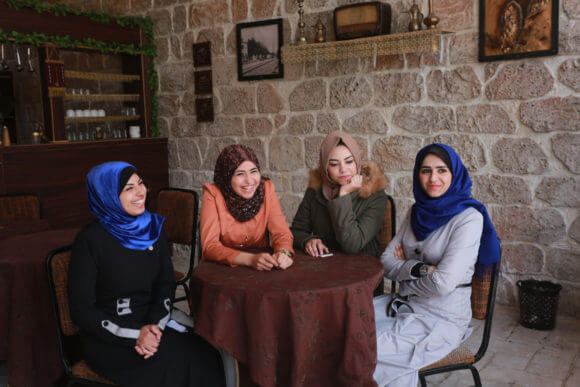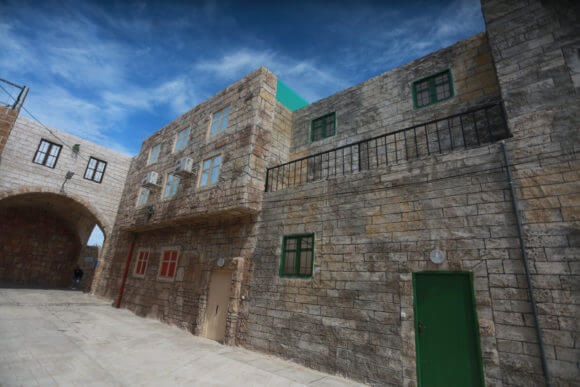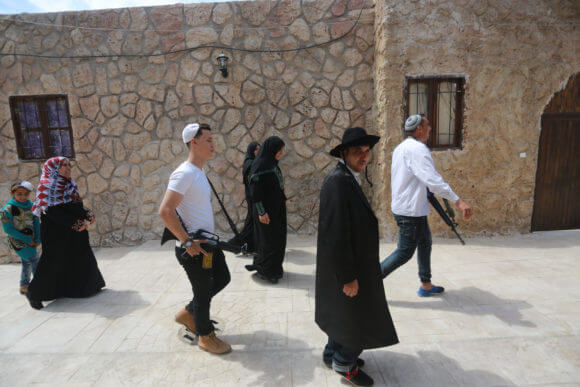Amid the quiet of Gaza’s white sand dunes covering the site of Israeli settlements evacuated more than a decade ago, palm trees and military training sites off in the distance, a tussle breaks out. The fight that pierces the silences emanates from inside of a hexagonal building where Palestinian actors portraying ultra-orthodox Israelis are arguing on set.
Filming for the dramatic series “Heaven’s Gate” is located in Gaza, but the show is set in Jerusalem, a city that is recreated inside of the besieged strip. The program will air this summer during Ramadan, on the Hamas-owned Al Aqsa TV network. The set spans 5 acres and looks like a version of Jerusalem’s Old City. Cafes, shops houses, and streets are recreated in Gaza with accents of bowed stone walls.
Yards away from the actors’ brawl, other Palestinians are costumed as Israeli soldiers. They prevent passers-by, women and children, from entering the “Old City,” in this case a Jewish holy site.
Dozens of Palestinians in their twenties gathered behind a camera mounted on a crane that was filming footage of the fight scene. The group said they are curious about Jerusalem. This is as close to visiting the holy city as any of them have come.



For Gazans, visiting Jerusalem is like a dream. The coastal enclave has been under siege for the last ten years, but there are travel exceptions granted in the form of special permits issued by the Israeli authorities. The two exceptions are as follows: Either these Palestinian 20-somethings must wait another 30 years to for their 50th birthday, at which time they automatically become eligible for a daytime permit to pray on Friday in the al-Aqsa Mosque, or they must become seriously ill or injured in order to receive an urgent humanitarian transfer to an Arab hospital in Jerusalem.
And even if these youths win entry permits, they are forced to ride in locked buses with tinted windows and windshields.
For the elderly in Gaza, up to 300 are allowed in at a time for Friday prayer at Al-Aqsa Mosque, Or the elderly parents of prisoners in Israeli jails (and children under 12) say those tinted windows are meant to prevent them from seeing the geographical features on the road to Jerusalem, so as to not arouse emotions about their displacement from the land of the Nakba, the 1947-49 war between Israel and Arab nations that made nearly 800,000 Palestinians refugees. Many of them and their heirs now live in Gaza.
Back to those curious youths at the scene of the series, “Heaven’s Gate.” I met Ra’ed Qandil, 29, who arrived at the site: “I went to a corner of the model city and wept silently…Do you know what it means to a man to shed tears silently? I envisioned everything about old Jerusalem, its people, narrow paths and arches, and even vendors of the city’s famous rings of sesame bread.”
Qandil, who had never left Gaza, asked the actor dressed as an Israeli soldier to beat his face with an M-16 prop gun. He told me he wanted to experience the pain of Jerusalemites who have been roughed up by the Israeli police.
The actor obliged and clocked Qandil in the face. “You really kicked my ass man,” Qandil exclaimed.
“But there is a big difference between a free holy city like Mecca and another that is captive by people who occupy everything in your city, who even try to steal names, and prevent you from performing religious rites,” Zuhdi told Mondoweiss. “I remember on my previous visit to Jerusalem that even the air changes once I leave Gaza and becomes pure in Jerusalem, so the oxygen of Jerusalem has a distinctive smell,” he added.



In October 2015, violence in Jerusalem sparked again. The city’s status is part of the basis of the Israeli-Palestinian conflict. Since the establishment of Israel almost seven decades ago, Palestinians in Gaza, the West Bank and Jerusalem view the holy city as subjected to a daily campaign of severe oppression against the Jerusalemite Palestinians, in a process of Judaization of its Arab and Islamic heritage, architecture and history.
That Judaization included the names of places, using a Hebrew name for streets and also changing archaeological sites, by ignoring one identity of a place and celebrating the concepts and names solely associated with Judaism.


At the bottom of a sign that reads “Ha-Malakh Rd.,” Rawan Suhail said that this place evokes feelings of passionate patriotism towards a city that will someday be the capital of Palestine, either by diplomatic means or armed conflict.
Rawan refuses to visit Jerusalem until it is liberated. “I will not go to a part of my country that is under occupation where there are arrests, murders, and residents are forced to demolish their own homes.”
Ensaf Habib, 23, said she was proud when her friend once wrote her name with the Dome of the Rock in the background in a cellphone photo. “A feeling that urges you to weep due to our powerless to go there, but our names are there.”
An actor in an Israeli soldier’s uniform Tamer Sahloub, 24, says he knows nothing about the holy city except what he sees in television news. “I am eager to go there and I will not think of any retaliatory action. I will only walk in the alleys, touch the rough walls and tell the residents of Jerusalem that I am from Gaza. I am from the other part of the country”.
Tamer, who works as a teacher, believes that the case of Gaza and Jerusalem case is similar to the situation of North and South Korea. “Both [peoples] are forbidden to meet with each other.”
Ibrahim al-Madhoun, director of the Hamas-affiliated Future Research Center in Gaza, confirmed that preventing Palestinians from reaching Jerusalem is a systematic Israeli policy to push them to forget their holy sites.
“The Israeli authorities deliberately insult and arrest people who try to reach Jerusalem or al-Aqsa Mosque and impose conditions to make it difficult for them to return, and thus forget,” Al-Madhoun told Mondoweiss.
Outside of the TV set of Jerusalem in Gaza’s streets, pedestrians drew attention to a road sign that reads “Jerusalem 81.44 km” (about 50 miles) despite the fact that no cars can go there. For many, it is an emotional reminder that Jerusalem is the future capital of a Palestinian state in waiting.











heartbreaking read. great photos. thank you Ahmad Kabariti.
On Jerusalem and on the diplomatic front another major Israeli victory according to Ynet news, cited on the Bible and Interpretation site. Unesco resolutions referring to Jerusalem, over which there was much trouble, are withdrawn!
The forthcoming Unesco meeting will discuss something about the tombs of the Patriarchs, which for the outside world will be of no interest at all. Who says that accusations of anti-Semitism, skilfully wielded, are losing their former power?
Some Seinfeld show, this.
They’re so stupid
https://talknic.files.wordpress.com/2017/03/israeli-morons-01.jpg
https://talknic.files.wordpress.com/2017/03/israeli-morons-02.jpg
The Zionist control of space is a sign of paranoia. Palestinians are subdivided into 5 different groups- 1948, East Jerusalem, West Bank, Gaza and Refugees and all have spatial restrictions. It is the price of the fantasy that is the Jewish state. Future generations will look back on Israel now and ask WTF.